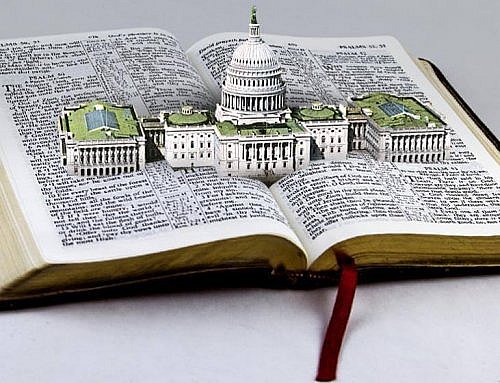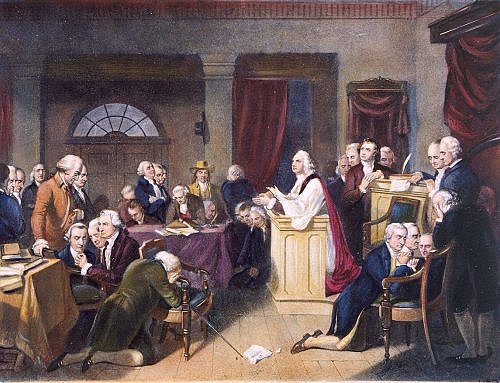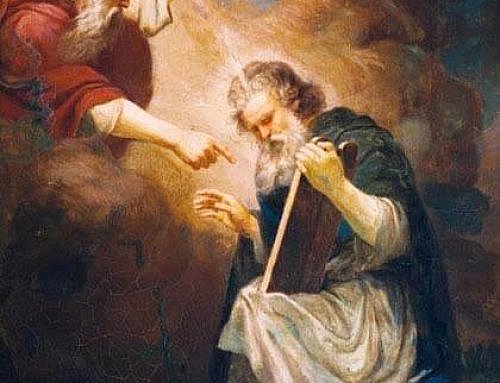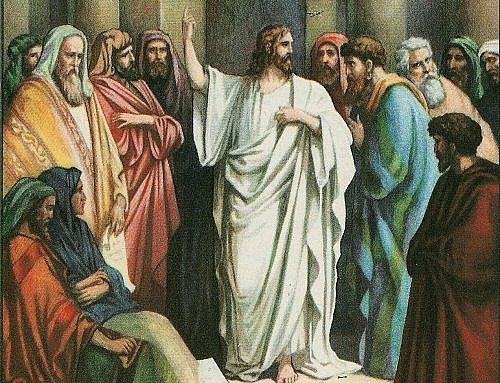In the Fall of 2007, Stephen McDowell participated in a panel discussion at Virginia Military Academy on the wall of separation of church and state. The following served as the basis for his opening remarks.
Many Americans use Jefferson’s phrase, “a wall of separation between Church and State,” to describe what they believe the Constitution prescribes for the relationship of religion and civil government. Recent authors1 have aptly pointed out how many today misapply or do not understand the “wall” metaphor — how it has been cut off from its historical meaning and made to communicate ideas contrary to Jefferson and the founders of America. The phrase “separation of church and state” has been repeated so often in an improper context that many incorrectly believe that our Constitution mandates a strict separation, meaning a restriction of religious influence upon civil government and the public square. Many present the framers of the Constitution and the Founders of America as irreligious men who were strict separationists, thus, giving us “a separation of church and state.”
The Founders certainly believed in a jurisdictional separation of church and state, where these two legitimate institutions had specific responsibilities and authority in their jurisdictions, and neither should encroach upon the other. But to the Founders both of these were under the same Higher Authority who prescribed His will for man and the human institutions of family, church, and state through the laws of nature and nature’s God.
Honest examination shows that the founders were extremely religious men, who, not only had no qualms about letting their religious beliefs flow to civil matters, but considered, in the words of Washington, religion and morality the foundation of free governments. Even one of the least orthodox of the founders, Thomas Jefferson, mixed religion and civil matters in a way that would produce violent convulsions from modern separationists — writing laws punishing Sabbath breakers, granting the governor the authority to issue “days of public fasting and humiliation, or thanksgiving,” (including the punitive provision of a 50 pound fine on ministers failing to perform divine service on the appointed day), supporting the use of the Bible as a text in public schools, suggesting and approving the use of tax dollars to support missionaries.
A strict separationist view has produced many judicial rulings and actions of public and private figures that, while claimed as constitutional, would have been viewed as dangerous and subversive of liberty by those who gave us the Constitution. Some have been so ludicrous that almost everyone has reacted strongly, for example, the federal court ruling that it is unconstitutional for public school students to say “under God” in the Pledge of Allegiance. Strong reaction against the ruling came from many Democrats and Republicans, liberals and conservatives.
But others just as contrary to the views of the founders have passed with much less reaction, yet with the usual claim of their constitutionality, and accepted by many Americans as what our founders wanted. Thus, some things the courts have ruled as unconstitutional include: posting the Ten Commandments in schools (Stone v. Graham, 1980) and public buildings (Harvey v. Cobb County, 1993); having a prayer at a school graduation ceremony (Harris v. Joint School District, 1994); having a planter in the shape of a cross at a public cemetery (Warsaw v. Tehachapi, 1990); having a classroom library contain books which deal with Christianity, or for a teacher to be seen with a personal copy of the Bible at school (Roberts v. Madigan, 1990); displaying religious artwork in schools (Washegesic v. Bloomingdale Public Schools, 1993).
Even a cursory look at history shows many actions of the Founding Fathers, Jefferson included, would be considered unconstitutional by modern courts, and that the modern concept of separation of church and state has limited (if any) historical support. So then, why do so many people (citizens, judges, legislators, educators) not understand or misapply the “wall” metaphor (and similar ideas)?
There are various reasons for this. Certainly lack of knowledge or bad history is one chief reason. As Chief Justice Rehnguist wrote (dissenting in Wallace v. Jaffree, 1985):
The “wall of separation between church and State” is a metaphor based on bad history, a metaphor which has proved useless as a guide to judging. It should be frankly and explicitly abandoned.2
One fundamental reason, which also explains why those who have knowledge of the founders’ actions and thinking yet still embrace a strict separationist view claiming its constitutionality, is that America has been undergoing a change in the foundation of law and a change in the view of the nature and purpose of law. Modern rulings and actions reflect this philosophical change in law.
America’s founders generally had a Christian view of law, where law is rooted in the absolutes of a Supreme Creator who reveals His will (law) to man, while modern man generally has a humanistic or evolutionary view of law, seeing that it originates in man. This is evidenced not only in the legal and political arena, but in all areas of life. The differing views can be encapsulated by comparing the definition of immoral from the founding era with that of today.
Noah Webster, in his An American Dictionary of the English Language (1828), writes under his definition of immoral: “Every action is immoral which contravenes any divine precept, or which is contrary to the duties men owe to each other.” The standard for immoral action is “divine precept.” A modern Webster’s New World Dictionary defines immoral as “not in conformity with accepted principles of right and wrong behavior.”3 Thus, the consensus of man — not divine precept — determines right and wrong behavior.
In church-state discussions, the following fundamental idea is usually overlooked: Every nation is established upon some set of principles or presuppositions, which ultimately are rooted in the faith of the people. Thus all nations have a religious foundation. These presuppositions provide the source of law, the philosophy of government, the standard for moral and lawful behavior, as well as the foundation for building all of societal institutions.
A fundamental question for all nations to consider is, “who is the source of law of the society.” This is of primary importance because the source of law of a society is the god of that society. To whom a people look as the standard for lawful behavior is the ultimate source of truth for them. Hence, even those who are secular and say they believe in no god, still have a source of “truth” — a source for what is lawful or unlawful, moral or immoral, and their laws will reflect this. This source may be the consensus of society, which then is a belief that man is the ultimate source of law. With such a view, law (and truth) will change or evolve as the view of the majority (or a powerful minority) changes. In such a society, the fundamental rights of citizens, especially the minorities, will have no secure base.
American was founded as a Christian nation; that is, it was founded upon the principles of Christianity. The Bible was the source of law for the nation, as well as the foundation for all societal institutions. America was not an ecclesiastical state, where the church or a particular denomination governed or received preference (though a majority of the states had some form of establishment when the Constitution was ratified; the first amendment merely prohibited the national government from an establishment).
Our Constitution does not mandate a separation of Godly principles from government, but it does establish a jurisdictional separation of church and state. The founders believed that God created individuals and three divine institutions — family, church, and state (or civil government) — and that each of these had different purposes and responsibilities. All were under God’s jurisdiction, they were subject to His higher law (the laws of nature and nature’s God). The first amendment prohibited a national church, an ecclesiastical establishment, as there had been in Europe. It also was intended to keep civil government from usurping the authority of the individual, family, and church.
The greatest violation of the Founders view of jurisdictional authority has come, not from the church or Christian people usurping authority from the state, but from the state usurping authority from individuals, families, and the church. James Madison’s comment regarding a bill to subsidize Cod fishermen (1792) reveals the very limited view the founders had of the role of the national government in society.
If Congress can employ money indefinitely to the general welfare, and are the sole and supreme judges of the general welfare, they may take the care of religion into their own hands; they may appoint teachers in every state, county, and parish, and pay them out of their public treasury; they may take into their own hands the education of children, establishing in like manner schools throughout the Union; they may assume the provision for the poor; they may undertake the regulation of all roads other than post-roads.4
The Founders spoke of America as a Christian nation numerous times. This was expressed by many leaders in church and state, by courts and legislatures, and all types of citizens. To them, America was a Christian nation, but this did not mean that Christianity was the established religion, or that every citizen was a Christian, or that the nation was without sin. This meant that the nation was founded upon Christian principles, where biblical truth and law was the standard for public life, law, and societal institutions.
The evidence of the Christian foundation is overwhelming and broad, and includes: 1) the motive and Christian influence in colonization; 2) the Christian foundation and source of our law; 3) the nature and content of specific laws; 4) Christian nature of societal institutions of family, education, economics, private organizations; 5) Christian thought and life of the founders; 6) the Christian power and form of our government; 7) testimony of public actions and words; 8 the central role of the Bible; 9) the fruit of obedience to the precepts of Christianity produced liberty, prosperity, and service.5
Some who have knowledge of this evidence concede that we were Christian at one time, but they say this does not matter today, for we no longer are Christian. We are pluralistic, comprised of people of many faiths. To them we must, therefore, act as if Christianity is just one of many religions, and it must be kept out of influencing public affairs, and people who are Christian should keep their faith private. It is true that Christianity has greatly diminished in its role in America, but are we to therefore act as if it is irrelevant to our public life? What would the Founders think concerning this?
First, our Constitution still presupposes a Biblical view of law and life — in the words of Adams only a Christian people can provide the power to support it. Any change to this must come in a constitutional manner, not through activist judges, spurred on by instruction of misguided law schools. As we debate what changes we wish to enact, Americans must understand that the source of our liberty, law, and prosperity was Christianity. If we remove the foundation, we will remove the source of what has made America great. People who are attempting to remove God from public life are removing that which produced the liberty they now have (which they are wrongly using to speak out and attack God). If God is completely removed, there will be no more liberty or justice for all. (Remember the communist nations of the twentieth century; and consider the growing hostility toward Christianity from western secular nations.) Pluralism is most possible in a Christian nation.
Second, a large majority of Americans still believe in God, that He created life, that the Ten Commandments should be on the walls of public buildings, and that children should be able to voluntarily pray in schools. A secular minority has been ruling over the majority views of Americans.
Third, all nations are built upon some religion, where law has as its source that which society considers as supreme. A religiously neutral state is a myth. We must choose which faith (source of law; standard for conduct, etc.) we want to have our nation built upon.
America’s foundation was Christian, but has been changing to a secular base, where man is god — man is his own source of law. Man determines for himself what is right and wrong, though more accurately for society at large, it is a few men, certain judges or lawmakers, who determine what is right and wrong. In the words of an early Twentieth Century Harvard Law School President, Roscoe Pound, under this new law system, “the state takes the place of Jehovah.”
The Founders believed, from Biblical and historical knowledge, that Christianity produces liberty. If Christian principles are removed from public and private life in America then liberty will diminish. The father of American Geography, Jedidiah Morse wrote: “To the kindly influence of Christianity we owe that degree of civil freedom, and political and social happiness which mankind now enjoys.”6 Noah Webster wrote in his U.S. history textbook “that the genuine source of correct republican principles is the Bible, particularly the New Testament or the Christian religion.”7 Signer of the Declaration, and father of American medicine, Benjamin Rush said, “Christianity is the only true and perfect religion, and that in proportion as mankind adopt its principles and obeys its precepts, they will be wise and happy.”8
If evolving law and the sovereignty of the state continues to replace the absolutes of God’s law in the American republic, “separation of church and state” will come to mean what it does in communist and secular nations — civil government will become the ultimate authority with the church and all other spheres of life under its domain and control.
End Notes
1. See Daniel L. Dreisbach, Thomas Jefferson and the Wall of Separation between Church and State, New York: New York University Press, 2002; Daniel L. Dreisbach, “‘Sowing Useful Truths and Principles’: The Danbury Baptists, Thomas Jefferson, and the ‘Wall of Separation’”, Journal of Church and State, Vol. 39, Summer 1997, pp. 455-501; Religion and Political Culture in Jefferson’s Virginia, Garrett Ward Sheldon and Daniel L. Dreisbach, editors, New York: Rowman & Littlefield Publishers, 2000; Robert L. Cord, Separation of Church and State,. New York: Lambeth Press, 1982; David Barton, Original Intent, Aledo, Tex.: WallBuilder Press, 1996.
2. Wallace v. Jaffree, 472 U.S. 38 (1985) at 92, 106-107 (Rehnquist, J., dissenting).
3. Noah Webster, An American Dictionary of the English Language, New York: S. Converse, 1828, definition of immoral. Webster’s New World Dictionary of the American Language, David B. Guralnik, editor, Nashville: The Southwestern Company, 1969, p. 373.
4. “On the Cod Fishery Bill, granting Bounties,” February 7, 1792, in The Debates of the Several State Conventions on the Adoption of the Federal Constitution as Recommended by the General Convention at Philadelphia in 1787. . . , in Five Volumes, by Jonathan Elliot, New York: Burt Franklin R, Vol. IV, p. 429.
5. See Stephen McDowell, America, a Christian Nation, Charlottesville: Providence Foundation, 2004.
6. Jedidiah Morse, Election Sermon given at Charleston, MA on April 25, 1799.
7. Noah Webster, History of the United States, New Haven: Durrie & Peck, 1833, p. v.
8. Benjamin Rush, Essays, Literary, Moral and Philosophical, Philadelphia: printed by Thomas and William Bradford, 1806, p. 93.





